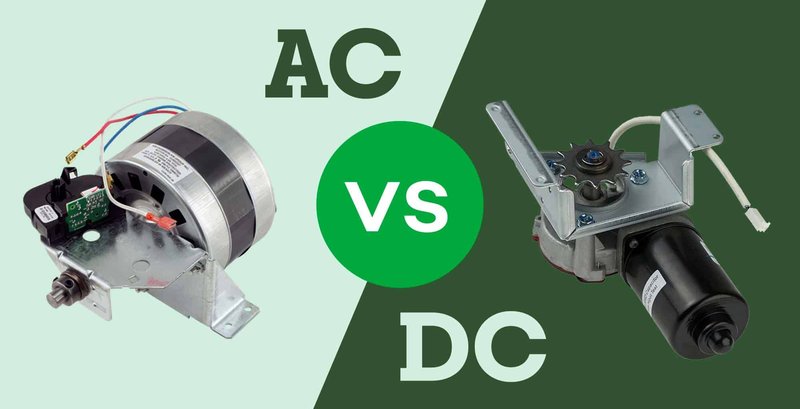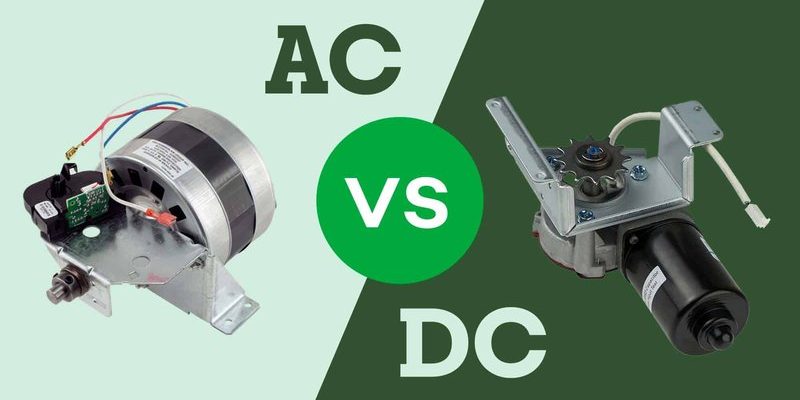
In the world of garage door openers, understanding these two types of motors is crucial. They function differently, come with their own sets of advantages and disadvantages, and can directly affect your home’s efficiency, safety, and convenience. By the end of this deep dive, you’ll know exactly which motor suits your needs better, and you’ll be equipped with tips for choosing the right garage door opener. So, let’s unravel this together, step by step.
What are AC Garage Door Opener Motors?
AC motors have long been a staple in garage door openers. They’re known for their solid construction and reliability. If you’re picturing how these motors work, think of a sturdy train chugging along its tracks. They run smoothly, thanks to the alternating current that powers them.
Here’s the thing: AC motors usually require less maintenance than their counterparts. This is great news for homeowners. They have fewer moving parts, which means fewer things can go wrong. When you’re dealing with an AC motor, you can often expect a longer lifespan. Many come with features like built-in safety mechanisms, which can make your garage door operation even smoother.
But why are they so widely used? AC motors provide a strong opening force, which is perfect for heavier doors. If you’ve got a substantial wooden or steel garage door, an AC motor can easily handle the weight without breaking a sweat. The trade-off? AC motors can be a bit noisier than DC ones and can consume more energy, which leads to higher electricity bills.
The Lowdown on DC Garage Door Opener Motors
Now, let’s talk about DC motors. These motors are like the suave, tech-savvy cousin of AC motors. Instead of using alternating current, they run on direct current, giving you more control over their operation. Imagine a sleek sports car that accelerates smoothly—this is how a DC motor operates compared to the heavier, more robust feeling of an AC motor.
One notable benefit of DC motors is their efficiency. They often come with smart features like smartphone compatibility and battery backup, meaning that you can control your garage door from virtually anywhere. If you forget to close it before heading out, no stress — you can do it from your phone.
DC motors are generally quieter too, so if you have living spaces above the garage, that might be a consideration for your choice. However, they can be a bit pricier upfront. While their features often justify the cost, it’s important to weigh your needs against your budget.
Comparing Efficiency: AC vs. DC Motors
When it comes to energy efficiency, you’ll find the DC motors have the upper hand. Here’s a quick comparison to shed some light on the specifics:
| Feature | AC Motors | DC Motors |
|---|---|---|
| Energy Efficiency | Moderate | High |
| Noise Level | Louder | Quieter |
| Features | Basic | Advanced (Smart options) |
| Durability | High | Moderate |
With AC motors, you might spend more on your electricity bill monthly, especially if you open and close your garage door frequently. In contrast, a DC motor’s efficiency can lead to significant savings over time. If your garage door is used multiple times a day, those savings can really add up.
Maintenance Requirements for Each Type
Let’s face it; no one wants to deal with constant repairs and upkeep. This is where maintenance comes into play. Overall, you’ll find that AC motors require less routine attention. Thanks to their simpler design, there are fewer components that might need replacing. Regular looseness checks and lubrication can typically keep your garage door functioning without a hitch.
On the flip side, DC motors often come equipped with more advanced technology. This means while they offer nifty features, they might also have complex interference that requires occasional troubleshooting. If something goes wrong, you may need to consult the manual or a professional repair service more often than with an AC motor.
However, thanks to their efficiency and smart features, you might find it worthwhile to keep up with the maintenance. After all, can you put a price on convenience?
Installation Process and Cost Considerations
Getting a new garage door opener can bring about lots of questions, especially regarding installation costs and processes. Generally, both AC and DC motors can be installed by a professional for a fee or tackled as a DIY project if you’re handy.
If you’re looking at costs, AC motors might be easier on the wallet upfront. They can range from $150 to $300, but remember, installation can add around $100 to $200 more to that. On the other hand, DC motors run from about $200 to $500. Due to those advanced features, you’re paying more for the added convenience.
When considering installation, don’t forget about the long-term expenses. While DC motors are pricier upfront, their efficiency could lead to cost savings over time. So, weigh the initial investment against potential energy savings thoroughly.
Smart Features: A Game Changer for Garage Door Openers
Smart features are all the rage these days, and it’s no different for garage door openers. Many DC motors now come equipped with these features, allowing you to sync them with your smartphone or home automation system. Picture this: you’re on vacation and want to let someone in. With a quick tap on your phone, you can open the garage door remotely.
AC motors have started catching up, with some models integrating basic smart functions. But if innovative technology is a priority for you, then the DC opener will likely serve you better. You might be wondering how complicated it is to install these features; many systems come with straightforward instructions that even a beginner can follow.
Investing in a smart garage door opener means better peace of mind, enhanced convenience, and even the potential to lower your home insurance. Many insurers give discounts for homes equipped with smart security features, making it a win-win.
Noise Levels: Which Motor is Quieter?
Let’s talk about noise—something important if your garage is attached to your home or right next to your living space. DC motors shine here, being noticeably quieter than their AC counterparts. If you’re installing this door in a space where silence is golden, opting for a DC motor makes practical sense.
That said, AC motors come with added power which can sometimes lead to a bit of noise. If you’re just using the garage for storage or seasonal decorations, this might not be a dealbreaker. But if you plan to come and go at odd hours, or sleep right above the garage, you might want to keep the noise level in mind when making your decision.
Safety Features in Garage Door Openers
Safety is non-negotiable when it comes to garage doors. Both AC and DC motors usually come equipped with essential safety features like automatic reversing mechanisms. This helps prevent accidents by ensuring that if the door encounters an obstacle, it will stop and reverse its path.
However, many DC motor models offer more advanced safety features, including smart sensors that detect if anything is in the way. Some even have built-in cameras for monitoring. So, if peace of mind is critical for your family’s safety, consider what additional features those DC motors can provide.
Final Thoughts: Which Motor Is Right for You?
Deciding between AC and DC garage door opener motors boils down to your specific needs. If durability, lower upfront costs, and simplicity are your priorities, then an AC motor could be the way to go. But if you’re after efficiency, quieter operations, and smart technology—while being willing to invest a bit more—the DC motor is likely more appealing.
Consider how often you use your garage door, your budget, and what features are most important to you. Ultimately, you want a system that fits seamlessly into your lifestyle. Whichever choice you make, both types have their strengths that can elevate your garage experience.
In the end, whether you go with AC or DC, remember to take proper care of your garage door opener. Regular maintenance is key to ensuring longevity, no matter the motor you choose. And as you power up your garage with your new opener, rest easy knowing you made an informed choice.
